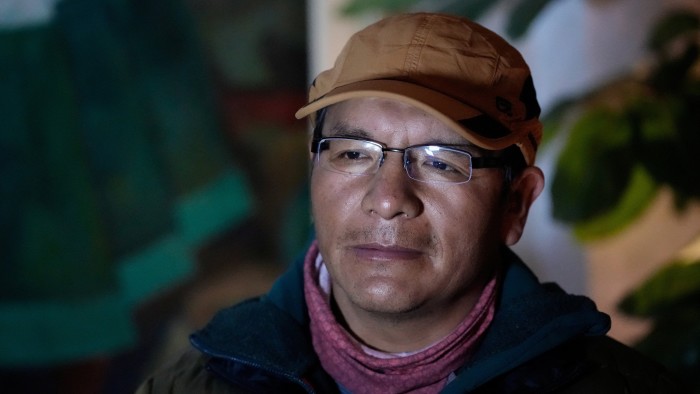Stay informed with free updates
Simply sign up to the Climate change myFT Digest — delivered directly to your inbox.
A German court has thrown out a landmark climate lawsuit brought by a Peruvian farmer against power company RWE over the threat to his home from global warming, bolstering the argument of other major polluters facing similar cases.
In the decade-long case, Saúl Luciano Lliuya argued that RWE should help pay to protect his home from flooding linked to glacial melt, because of the energy group’s historical contribution to climate change.
While a ruling by the Higher Regional Court in Hamm on Wednesday confirmed the legal principle that polluters could be held accountable for climate harms abroad, the judges said that in the case of the Peruvian farmer the flood risk was not high enough. No appeal is possible.
The setback for climate litigators could damp the momentum of related ongoing cases in Europe against big polluters, including Swiss cement company Holcim and French energy company TotalEnergies.
It follows a decision by a Dutch court last year not to uphold a ruling telling Shell to cut its emissions, and a series of recent counter-attacks by the Trump administration against US states’ efforts to hold fossil fuel groups accountable for global warming.
RWE said in a statement that the attempt “to create a precedent for holding individual companies responsible for the effects of climate change worldwide under German law has failed”. It had previously said that “climate targets belong on the political agenda and not in a courtroom”.
The Hamm court said on Wednesday that there was no risk of “concrete” damage to the farmer’s property.
The case brought with the support of the non-profit Germanwatch in 2015 drew on research alleging that RWE was responsible for 0.47% of global man-made emissions since the industrial revolution, making it one of Europe’s biggest polluters. Lliuya’s lawyers argued that RWE should contribute a similar proportion or about $17,500 to a flood defence project.
The power company, which has operations in Asia, Europe and the US, is phasing out coal-fired power plants, but since the Trump pushback on green energy it has said that it would scale back renewables investments.
Sébastien Duyck, senior attorney at the Center for International Environmental Law, said that with more than 43 similar cases pending globally “the fossil fuel industry and its financial backers face growing pressure to take responsibility and urgently transition towards a rapid phaseout of fossil fuels”.
In the US, the Supreme Court in March rejected an effort by Republican attorneys to block lawsuits against the oil and gas industry by states including California and Connecticut.
US President Donald Trump’s justice department has sued Hawaii and Michigan to try to stop their pending litigation against oil and gas companies, as well as Vermont and New York to stop their efforts to make energy companies pay for damages caused by climate change by contributing to superfunds.
Some experts framed the German decision as a victory for activists, because the court upheld its 2017 position that polluters could be held accountable for climate damages under German civil law.
“The ruling affirms a key legal principle,” said Joana Setzer at the London School of Economics and Political Science. “Just as courts [in the Shell case] have confirmed that companies have a responsibility to change their future behaviour in response to climate change . . . they can also be held accountable for the damage already caused by past emissions.”
The court said on Wednesday that the case had not been invalidated by the distance between RWE’s power plants and the farmer’s home.
Activists have turned to international courts to seek their opinion on climate change. The Inter-American Court of Human Rights and the International Court of Justice are both preparing opinions on countries’ obligation to respond to climate change.
The International Tribunal for the Law of the Sea said last year that CO₂ emissions qualified as marine pollution and that countries must curb these.
Noah Walker-Crawford, a research fellow at the Grantham Research Institute, said that “one of the main reasons climate court cases exist to begin with is that there’s been insufficient political progress on climate change over the past decades . . . communities are turning to the courts really out of desperation.”
Climate Capital

Where climate change meets business, markets and politics. Explore the FT’s coverage here.
Are you curious about the FT’s environmental sustainability commitments? Find out more about our science-based targets here
